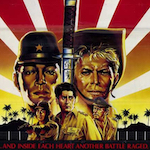 August 25, 1983
August 25, 1983
After all the bullshit I happily dissected for this Summer of Nub series, I knew I shouldn’t skip the revered international classic that dropped in the final week of August ’83. The one that’s in the Criterion Collection, that was brought up so lovingly when co-star David Bowie died in 2016, and when composer/co-star Ryuichi Sakamoto died in March. I’ve been giving you the lowdown on every cheapjack part 3, off brand space opera and fantasy sword guy you ever heard of, then right when I’m about to wrap up I swing in with this highly acclaimed drama that happens to have been released in four American theaters between JARED-SYN and HERCULES. Film criticism won’t know what hit it.
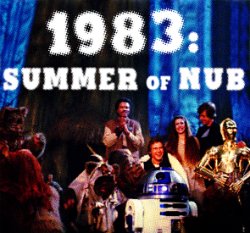 One problem, though: what if it turns out I don’t really understand MERRY CHRISTMAS, MR. LAWRENCE very well? What then? Well, I guess I’ll just confess that up front. We must be able to admit that we don’t know everything. But come along and help me parse it, if you want.
One problem, though: what if it turns out I don’t really understand MERRY CHRISTMAS, MR. LAWRENCE very well? What then? Well, I guess I’ll just confess that up front. We must be able to admit that we don’t know everything. But come along and help me parse it, if you want.
I really went in blind, so this was news to me yesterday: it’s the story of mostly British prisoners in a Japanese P.O.W. camp in Java, 1942. The titular Lieutenant Colonel is played by Tom Conti, who’s immediately unmistakable as the guy who played Albert Einstein in OPPENHEIMER. It’s impressive because yeah, he looks so much like Einstein, but the resemblance never would’ve occurred to me. Casting directors know what they’re doing.
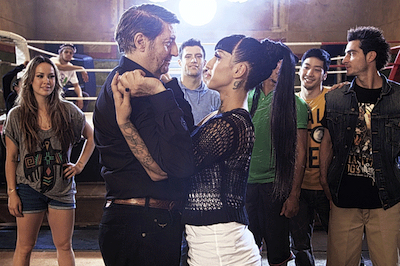 (Oh, and before you get mad that I didn’t mention it, yes, he was also Manu in STREETDANCE 2. Obviously.)
(Oh, and before you get mad that I didn’t mention it, yes, he was also Manu in STREETDANCE 2. Obviously.)
Lawrence is in a strange position because he’s the only prisoner who speaks Japanese. The guards sort of like him, because he makes their job easier by translating, but he’s also like the good kid who has more pressure on him to narc out whoever erased the teacher’s notes from the blackboard. And he seems to have a peacemaker, let’s-all-get-along, put-a-positive-spin-on-things type personality anyway. So he gets in awkward situations trying to please both parties.
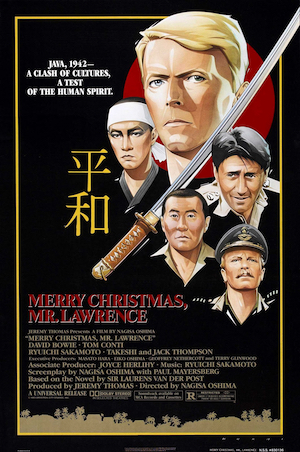 Their captors are not nice. They don’t mind clubbing people. They also don’t mind executing people. In the first major incident Lawrence is trying to stop Sergeant Hara (comedian Takeshi Kitano in his first major acting role, just credited as “Takeshi”) from forcing one of his men (Johnny Ohkura, later in Kitano’s BOILING POINT) to commit seppuku. I have to admit I was unsure whether this guard had tried to rape the Dutch prisoner De Jong (Alistair Browning, later Damrod in THE TWO TOWERS and RETURN OF THE KING) or whether a consensual relationship had been discovered. The Dutchman gets so upset he bites his tongue and faints. And this will not be the last strange fainting possibly related to repressed homosexuality.
Their captors are not nice. They don’t mind clubbing people. They also don’t mind executing people. In the first major incident Lawrence is trying to stop Sergeant Hara (comedian Takeshi Kitano in his first major acting role, just credited as “Takeshi”) from forcing one of his men (Johnny Ohkura, later in Kitano’s BOILING POINT) to commit seppuku. I have to admit I was unsure whether this guard had tried to rape the Dutch prisoner De Jong (Alistair Browning, later Damrod in THE TWO TOWERS and RETURN OF THE KING) or whether a consensual relationship had been discovered. The Dutchman gets so upset he bites his tongue and faints. And this will not be the last strange fainting possibly related to repressed homosexuality.
Bowie (YELLOWBEARD) plays Major Jack Celliers, a defiant and smart-assed prisoner transferred to the camp. He does things like gather flowers and eat them during a forced hunger strike. This seems to infuriate the rigid commander of the camp, Captain Yonoi, played by Ryuichi Sakamoto, at that time known from the pioneering electronic group Yellow Magic Orchestra, and as a solo artist, making his acting debut. He also provides the excellent score (his second after IT’S ALL RIGHT, MY FRIEND, also released in ’83). Yonoi later blames Cellier and Lawrence for a contraband radio and locks them in cells next to each other, planning to execute them. Yonoi knows Lawrence didn’t do it, but insists “We must punish someone.” Lawrence tries to shame him for thinking it’s better to not find out who did it, and punish the wrong person, than to not find out who did it and punish no one.
“You mean I have to die, because you think if there’s a crime, then it must be punished, and it doesn’t matter who is punished?”
“Yes.”
Yonoi doesn’t see anything wrong with his logic.
Here’s the part that went over my head: as Wikipedia puts it, “Sensing a kindred spirit in Celliers, Yonoi’s fascination grows into a romantic obsession.” Yeah, I didn’t pick up on that, and still don’t know where it was implied. But there’s David Bowie’s head sprouting from a military uniform, nothing toned down about his striking rock star handsomeness and blond hair, surrounded by ordinary looking people. You can see why if you were gonna get obsessed with one of the prisoners, that would be the guy. Yonoi’s “batman” (apparently a term for a type of assistant) is so concerned about Yonoi’s crush or whatever on Cellier that he sneaks into his cell to murder him at night, fully intending to give his life for this cause. Cellier fights him off, escapes, lets a weakened Lawrence out and tries to carry him to freedom. They’re sort of joking and laughing about it, maybe aware of the hopelessness of the cause. They’re stopped, of course, and Yonoi challenges him to a duel (as you should always do to a boy you like) but he’s busy, he has to wash his hair that day or something.
MERRY CHRISTMAS, MR. LAWRENCE is the third-from-last film of director Nagisa Ōshima (THE CRUEL STORY OF YOUTH, VIOLENCE AT NOON, IN THE REALM OF THE SENSES). He co-wrote it with Paul Mayersberg (THE MAN WHO FELL TO EARTH), from the book The Seed and the Sower by South African writer Sir Laurens van Der Post. I don’t know the book but I read that it’s three separate stories set in the P.O.W. camp: one about the relationship between Lawrence and Hara, one from the diary of Celliers, and one the story Lawrence tells about a woman he met before he was captured. Learning that these were presented as separate stories (the first was even published as a short story under the title A Bar of Shadow) explains the odd structure of the movie – it’s surprising when, 75 minutes in, Cellier starts telling Lawrence about his childhood and for the first time in the movie we leave the camp for a full-on flashback about a little blond boy (James Malcolm) singing like a choir boy in a beautiful flower garden.
I assumed the boy was Cellier, but it turns out to be his younger brother. Little bro is a good singer and in church he laughs at some older kids for singing “two full notes off.” A couple days later they’re walking in the hills, a dramatic “BONGGGG!” strikes on the soundtrack and half a dozen kids, two dogs and a bunch of sticks are waiting on the hill to avenge this savage church crime. The older brother (Chris Broun as 12-year-old Cellier), takes a beating to protect the younger brother.
Later, when they’re attending the same school, Celliers shamefully hides and doesn’t intervene as the upper classmen cruelly haze the kid and humiliate him by making him sing, yelling at him, and taking his shirt off (and he has some kind of protruding backbone issue?). Grown up Cellier remembers his cowardice, that he pretended not to know about the incident even though he was hiding nearby when it happened, and how his brother “never sang another note, ever.” It’s tame compared to what happens at the veterinarian school in RAW, but it’s weird and upsetting to see this sensitive boy who must be ten at most being mobbed and bullied by kids who look at least 16 and in some cases more like 25. Jesus christ, man, leave that kid alone. What the fuck are you doing?
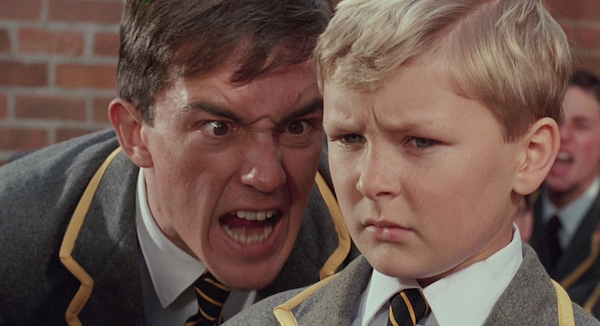
And it’s extra-surreal because (in what I believe is meant to be a symbolic depiction, not a literal one) schoolboy Cellier is portrayed by Bowie himself, around 36 at the time, about to release his 15th album. Hey, rock star David Bowie, did you finish the math homework? It’s definitely goofy, but I’m not really against it.
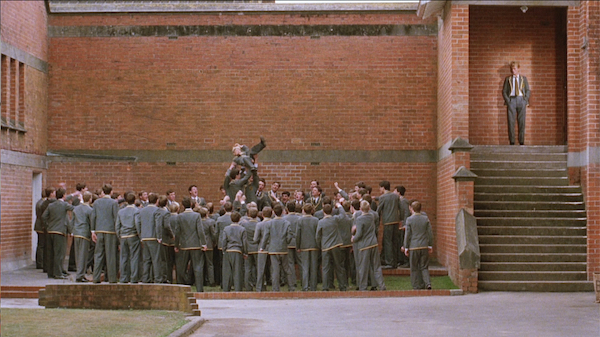
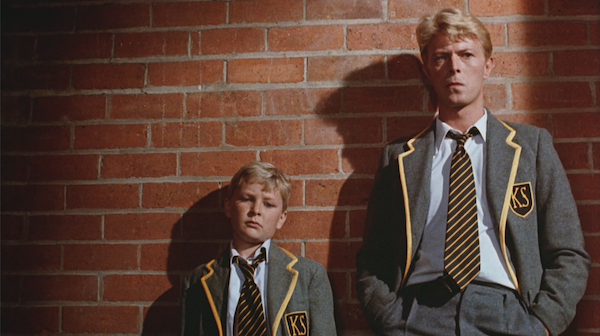
The title is similar to what Hara says (yes, in English) in a crucial scene where the sergeant gets “pissed as a newt” on sake and decides to free Lawrence and Cellier. He says another prisoner confessed to smuggling the radio, but he acts to them like it’s a Christmas present. There’s a feeling of “is this some kind of a joke?” followed by “oh shit, we better accept this before he changes his mind.”
This is not a very graphic movie, and it’s somehow less depressing than it might sound like, but there are some intense confrontations and some atrocities. To me the highlight is the final scene, set four years later, when Lawrence comes to visit Hara in an Allied prison, on the eve of his execution for war crimes. In some sense their roles have been reversed, not only because Hara is the prisoner, but because he’s learned more English out of an interest in the culture. They will still never be able to understand each other’s cultures, but they try.
Lawrence says some platitude about “Well, if it was up to me…,” and I think it’s sincere. But Hara’s not making a Hail Mary or anything. He has a little bit of self pity – “I’m ready to die, but I don’t understand. My plans were no different from any other soldier’s” – but mostly they reminisce like old friends. They laugh about the drunken Christmas incident. “Do you remember that Christmas?” Hara asks. Yeah, of course I fucking remember it.
They’re both so good in this scene, especially Kitano, as he keeps sadly saying, “thank you.” I like the ambiguity of the relationship. Officially, on paper, they’re enemies. They have reasons to hate each other. But they like each other. That they were in a fucked up situation together bonds them, even though they were (and are) on opposite sides. That they can have these bittersweet, nostalgic, philosophical minutes together is beautiful. Life and humanity can be beautiful. Even when they suck.
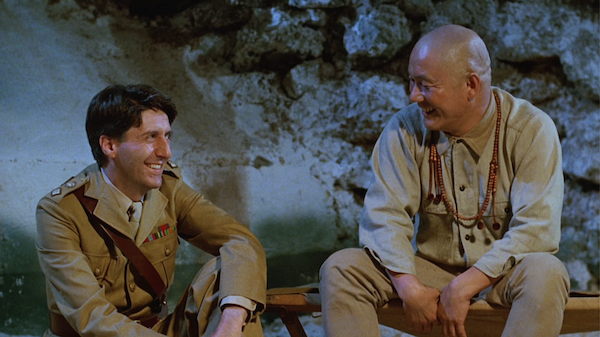
So maybe I did kinda understand this. It’s one of these movies that I enjoy the entire experience of but when all is said and done I realize I’m pretty unclear what it’s all supposed to be about. Sometimes I’m a dummy that way. But that’s okay. I got out of it what I got out of it.
As I mentioned, Universal opened MERRY CHRISTMAS, MR. LAWRENCE on four screens in the United States. In its fourth week they added 70 more screens. In its 8th week it got bumped up to 196 screens. It made $2.3 million in theaters, which is quite a bit more than FIRE AND ICE made.
The author of the book, van Der Post, had joined the British Army and surrendered to the Japanese in 1942, and said the book was based on his experiences in two different camps in Java. After the war he returned to South Africa, opposed apartheid, met Carl Jung, wrote a number of bestsellers including an anti-communist thriller (Flamingo Feather) that Alfred Hitchcock tried to make into a movie, became a television personality and supposed expert on the Kalahari Bushmen, brought Prince Charles on a safari to Kenya, was knighted and became godfather to Prince William, became a well known conservationist. But after his death in 1996 many began to believe that much of his supposed memoirs were fabricated or exaggerated, and a biographer discovered that in the fifties he’d sexually abused a 14 year old girl in his care, impregnated her and disowned the child. The movie is innocent, though.
As an actor, Sakamoto later appeared in THE LAST EMPEROR, and briefly in NEW ROSE HOTEL. His later film scores include THE ADVENTURES OF MILO AND OTIS, WINGS OF HONNEAMISE, THE SHELTERING SKY, TOKYO DECADENCE, WILD SIDE, SNAKE EYES, FEMME FATALE, HARA-KIRI: DEATH OF A SAMURAI, and THE REVENANT. I didn’t mention this, but tere’s a part of the score where the synths kinda remind me of the score for THE TEXAS CHAINSAW MASSACRE 2. I’m probly the only one. This movie got me interested in Sakamoto’s music, made me listen to some of his late ‘70s/early ‘80s electronic albums. It’s some good shit!
For Ōshima’s final film GOHATTO a.k.a. TABOO (1999), he reunited with Kitano and Sakamoto (as composer), and it seems to continue with some of these themes (it’s about homosexual attraction among elite samurai). So that’s probly one I wouldn’t quite understand either, but I should give it a shot.


























August 31st, 2023 at 3:16 pm
I interviewed Sakamoto once when I was editing a “world music” magazine. It seems weird and even condescending to use the word, but I mean it in the nicest, most positive way possible — he was one of the most civilized (as in genteel) people I’ve ever met. We spent about an hour together in a restaurant in New York and I felt like a shambling ape-man in his presence.